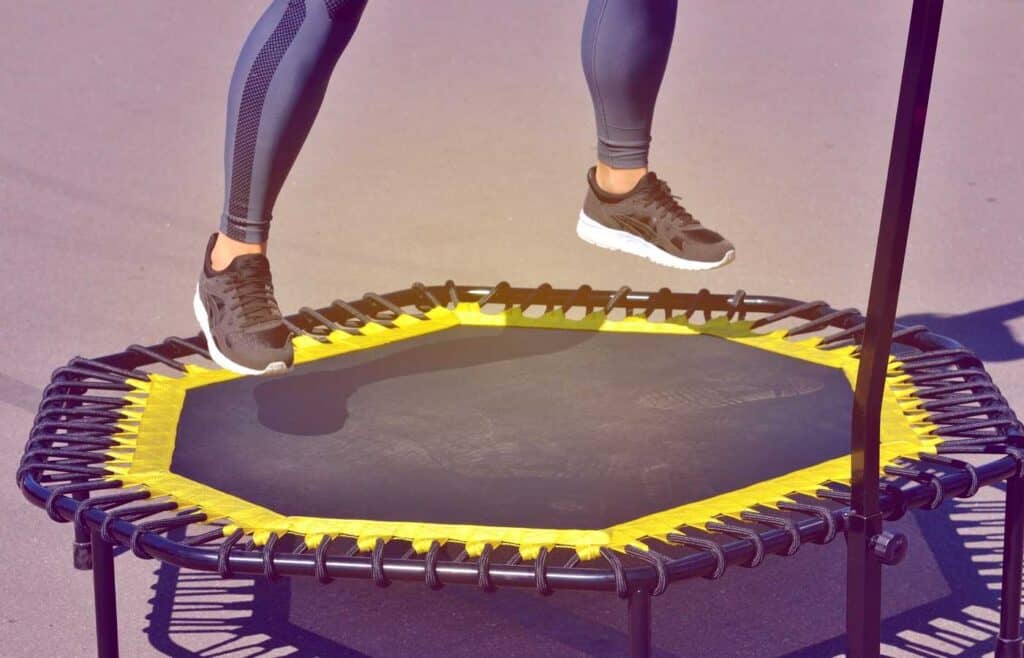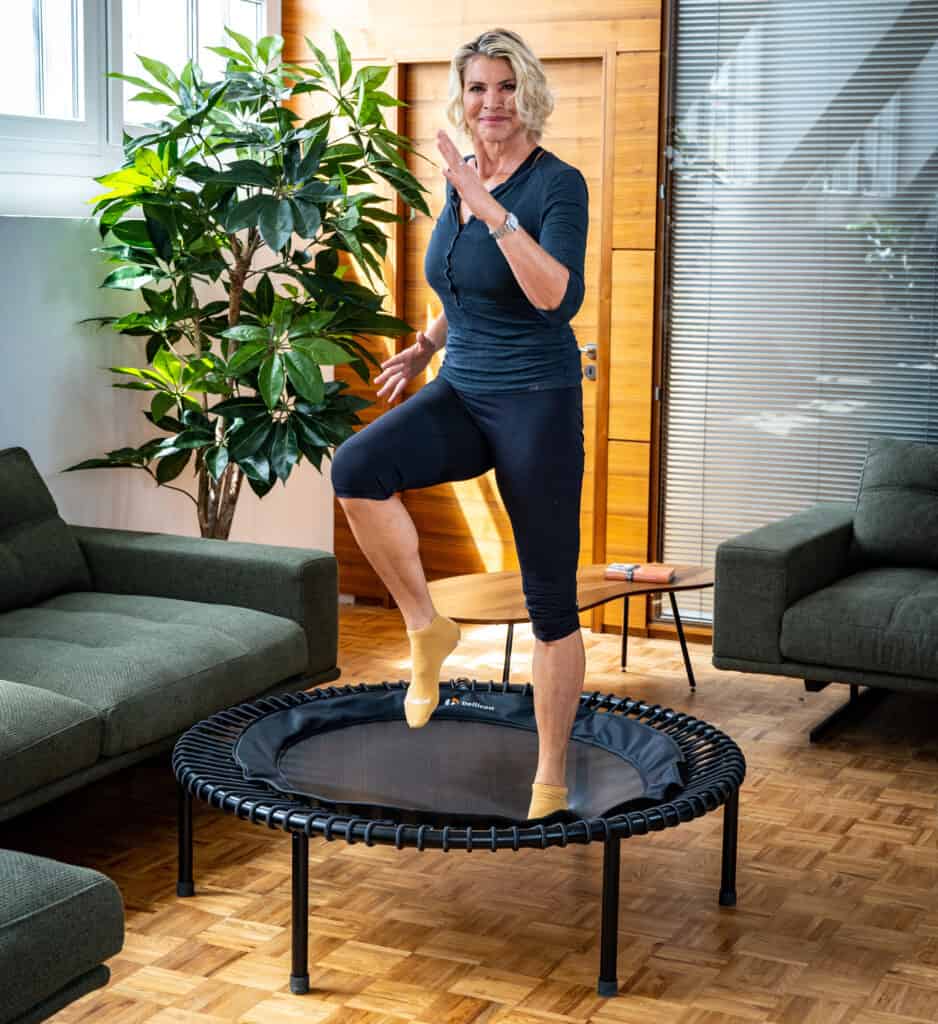Are Rebounders Loud?
If there’s one thing that can hinder your rebounding performance is noise. When you are in the zone and want to perform on your rebounder for 30 minutes or longer, having a noisy trampoline is something you can’t sustain for a long period.
But are rebounders loud? Rebounders are not loud, they typically do not make much noise at all but bear in mind the type of rebounder you choose. Spring rebounders can be slightly noisier than bungee due to the metal coils.
The truth is it depends on which rebounder you buy, the type of mat and springs. If you are looking for the best rebounders comparison, check our featured article. But there are workarounds if you have a rebounder that does make a lot of noise.
Here is my recommendation for a quiet rebounder that won’t make any noise:
- Safer, Quieter & More Durable: The Rebounder uses superior quality materials, such as bungee cords rather than springs, thick gauge steel to prevent warping, and added rubber washers to prevent the legs from coming loose, all of which provide a safer, quieter, and more durable cardiovascular exercise experience.
- Integrated Protective Mat: Our Rebounders feature a proprietary and continuously integrated protective mat that covers the bungees, which protects jumpers from falling through.
- Installation Made Easy: Each Rebounder comes with a free bungee installation tool, to make setting up your trampoline efficient and hassle-free. The legs also screw off, making for easy transport!
Last update on 2024-07-26 / Affiliate links / Images from Amazon Product Advertising API
Squeaky Rebounder
Why does my rebounder squeak?
It comes to no surprise that when you repetitively jump up and down on anything it’s likely to make some sort of noise. Although the rebounder design is to be jumped on, the squeaking sound can be caused by a number of reasons.
But the two main culprits are the friction between some of the metal parts like the frame and springs. Or you may get some friction at the joint of the frame which is an easy fix. If any of the metal has started to visibly rust it is no longer safe to rebound and advisable that you replace.
The other reason for rebounders making noise is to do with the mat, this could be due to poor quality or that it isn’t maintained. It’s important to regularly clean the mat from sweat and dirt.

Rebounder Metal Springs
If you already have a metal spring rebounder that is making some noise, worry not. We have some top tips on how to reduce the noise from the spring.
While springs are the perfect design to absorb impact, creating a noise is a by-product of the design. The spring is a tight coil which causes the noise when it snaps together.
How can I make my rebounder quiet?
More often than not, simply keeping the spring lubricated and clean should be a priority. This is the best way to keep noise to a minimum. Pay close attention to the frame where the metal spring hooks onto as greasing this will reduce friction and unwanted squeaking.
Here are our top tips on keeping your rebounder quiet so you can fully focus on the calorie burn!
- Lubricate the joints
You can use grease or vaseline on the joints of the springs. Simply apply a pea size amount to the top side of the eyelet where the spring hooks to the frame. Apply application jump up and down on the rebounder for 30 seconds to promote the spread of the grease around the joint.
- Use Oil on the Springs
Oil is a must have for moving metal parts. Not only does it act as a corrosion inhibitor but also is an effective lubricant. Once again when you spray the oil or apply it to the springs, use the rebounder for 30 seconds so the oil spreads fully around the springs and joints.
- Clean the mat
There are instances where the noise won’t be coming from the springs but the mat itself. As long as you regularly clear excess dirt and keep the mat dry it shouldn’t create any noise.
- Clean the frame
While you clean the mat you should also clean the frame. You can scrub the frame with soap and water. When you are done washing the frame make sure you dry the frame with a towel or you can leave the rebounder outside in the sun to dry.
- Fix damaged springs
Sometimes the main reason for rebounder noise is damaged springs. Springs are really easy to find; you just need to make sure you get the right size. Diagnosing broken springs is even easier, you will be able to see visible damage or rust to the spring.
Then you know it’s time to replace them. If you notice any rust on the spring you can spray rust remover. I recommend this:
Spray the liquid on the rusted area and leave it to get to work, typically give it a few hours then scrub away the rust with a firm nylon brush.
- Storage
Storage is more prevention than cure. When you store away your rebounder, try to place it upright. Luckily more rebounders fold up so often encourage you to store it upright but doing so will reduce the pressure on the springs and joints.

Choosing the right rebounder
Overall a well maintained and high quality rebounder or mini trampoline shouldn’t make any noise but if problems persist with unwanted squeaking follow the steps above steps. If you do not yet have a rebounder and are considering one a good choice is a bungee rebounder.
This is where the frame and mat are attached by bungee cords as opposed to metal springs. The benefit of this type of rebounder is there is little to no noise from the bungee as they are made of a stretchy and durable fabric so there is no friction.
Check out our full comparison in this article where we compare the bungee vs spring rebounder.
Are Bungee Rebounders quiet?
The only noise that a bungee rebounder may produce is from movement on the floor. Although they are built with rubber caps to avoid them sliding around, it is advisable to use these on a carpet or mat rather than the floor.
But the bungee cords themselves provide a silent bounce that doesn’t squeak or won’t disturb neighbours.
Not only do bungee rebounders quiet but also provide a much safer bounce that protects ligaments and joints from stress on each bounce.
Can you Use a Rebounder Upstairs?
If you are unsure about purchasing a rebounder because you will be using it upstairs or in an apartment building with neighbours down below then don’t fear! It’s perfectly fine to do so. Just remember to opt for a bungee rebounder that doesn’t squeak nor move around as much so will be quiet while you jump.
You can also place a heavy duty mat under the rebounder to absorb some of the noise:
Remember to step off the rebounder rather than jump off to create a quiet dismount.
Mini Trampoline Upstairs Apartment
The same applies if you intend on using your mini trampoline in an upstairs department. Consider a quiet dismount off of the trampoline and make sure you place a mat or rug underneath the legs (particularly on a wooden floor) so they don’t move around while bouncing creating more noise for your downstairs neighbours.
Final Thoughts
Rebounders are a fantastic investment to fulfil your weight loss and exercise goals. If you are concerned about the noise created, simply opt for a bungee rebounder and jump away – noise free!
An ex-triathlete, fitness coach and writer with a Masters in Sports Physiology. Fitness is my passion and I've had my fair share of home fitness equipment tried and tested!







One Comment